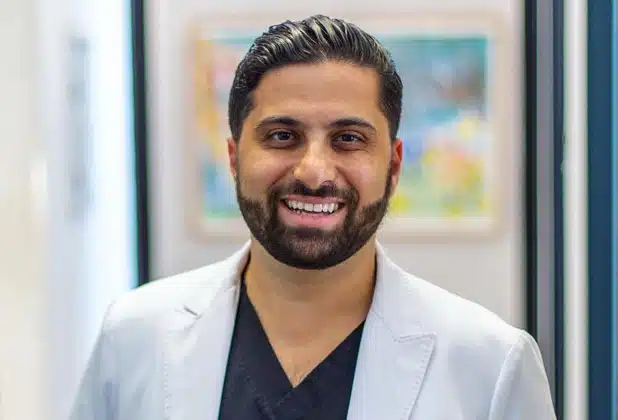
Meet Dr. Sam Harouni
TMJ
What is TMJ?
The temporomandibular joint (TMJ) is the hinge on both sides of your head that connects the jaw to your skull.
TMJ disorders affect the movement of your jaw and can cause chronic pain, making it difficult to chew or speak.
What causes TMJ disorders?
Genetics
Arthritis
Jaw injury
Facial Trauma
What are the symptoms of a TMJ disorder?
Difficulty chewing
Locking of your jaw joint
Aches or pain around your ears
Noise and popping sounds during opening and closing your mouth
What treatment options are available for TMJ?
Depending on the severity of your TMJ symptoms and the nature of your jaw issue, Dr. Harouni may initially recommend nonsurgical treatments to relieve pain. These treatments may include over-the-counter or prescription medications to prevent inflammation and pain in your jaw.
Dr. Harouni may also suggest oral appliances, such as a mouthguard, to protect teeth and jaws from damage caused by clenching and grinding.
In some cases, injection therapy using corticosteroids can relieve inflammation in the jaw joint. Dr. Harouni may also use Botox injections that temporarily paralyze the jaw muscles to relieve painful chewing or speaking.
When nonsurgical therapies aren’t effective in relieving pain or increasing jaw function, Dr. Harouni may recommend minimally invasive surgery to correct abnormalities in the jaw joint.
Does jaw surgery offer long-term relief of TMJ?
Corrective jaw surgery can relieve pain and dysfunction related to a TMJ disorder. Dr. Harouni also guides the prevention of the return of TMJ-related symptoms following surgery. He may suggest cutting foods into smaller pieces for easier chewing and avoiding sticky or chewy foods.
Dr. Harouni may also provide you with stretching exercises to do at home that strengthen your jaw muscles.
To end the chronic jaw pain of a TMJ disorder, schedule a consultation online or by calling the Beverly Hills office.


